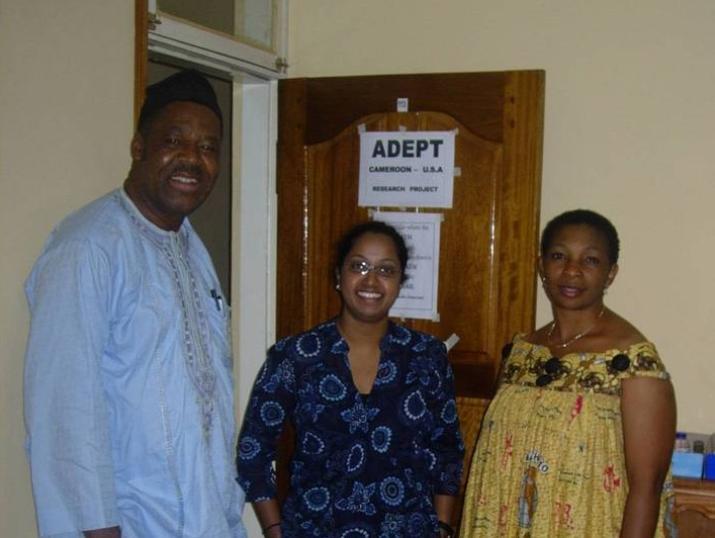
(From left) Joseph Nyingcho, CSCCD Interviewer; Seema Parkash CHP Research Coordinator; Shantal Asanji CSCCD Research Nurse
Published August 3, 2010, last updated on March 21, 2013 under Research News
In an African country where depression is rarely managed, and where there’s little known about mental illness among people with HIV, DGHI researchers are testing a pilot program to screen and treat patients for mental illness and train health care providers to also be depression care managers.
The DGHI-affiliated depression treatment intervention, called the ADEPT Project, is under way at an HIV clinic in Bamenda, a regional capitol in English-speaking Cameroon. Cameroon is a low-income country in central Africa where approximately 5.5% of the population is known to be infected with HIV. It is the first known project focused both on HIV and mental illness in Cameroon and one of few throughout sub-Saharan Africa.
“Resources to comprehensively respond to mental health disorders are limited,” said co-principal investigator and DGHI member Brian Pence, an infectious diseases epidemiologist in the Department of Community and Family Medicine and the Center for Health Policy. “There are few trained mental health specialists in the area, and there is fragmented health care at best. In fact, there is virtually no information on how prevalent mental health disorders are in the country.”
In a recent Global Health Exchange at DGHI, Pence noted there are five neurologists, three psychiatrists, and 33 psychiatric nurses for the country’s population of nearly 20 million. “In other words,” he observed, “our research team includes 20% of the neurologists and 3% of the psychiatric nurses in the entire country.”
He admits it will be challenging to develop a system that can function efficiently in a resource-poor setting, but Pence is hopeful that he can potentially improve the standard of care for mental health in Cameroon and elsewhere.
This spring, Pence’s research team conducted focus groups of HIV-positive patients, their families, and health care providers to assess how mental health is described, measured, experienced and treated in Cameroon, as compared to the US. The focus group team was led by Rachel Whetten and Seema Parkash of the Center for Health Policy and Julius Atashili of the University of Buea in Cameroon.
The team found that perceptions of mental health largely translate to Cameroon, with the exception of a few words and phrases, such as ”anxiety” and “feeling blue.” For example, “anxiety” is most often understood within a positive framework, associated with courage and excitement. While the negative aspect is understood, the word is often not used that way. This critical piece of information has allowed the team to tailor the language in mental health screening instruments for local use. The team is now measuring the accuracy of these tailored screening instruments in a validation study of 400 HIV positive patients over a five-month period, the largest cross-sectional screening of mental health for diagnostic testing in the country to date.
In what could be considered a model for mental health care in the US, the final intervention phase of the project will involve the training of depression care managers, who have some generalized medical skills, and can play a decision support role to HIV physicians who may not be trained in diagnosis and treatment of mental illnesses.
“A key part of our intervention is the training of HIV doctors in depression management. As an extension of our work, we want to build capacity in mental health so they can effectively address these issues in their patients,” said Pence.
The final phase of the project will follow the progress of 60 HIV positive individuals with depression over a one-year period. These patients will benefit from collaborative depression management between their physician and the study’s depression care manager, as well as receive free antidepressants during the project. Patients will meet with their physician and depression care manager monthly until their depression has been resolved, with the care manager making additional phone contacts between visits.
“Depression is well-recognized as a major barrier to successful medical treatment for HIV patients,” said Pence. “We’ll be looking to see not only if we’re able to help improve their depression, but also whether their physical health and their overall engagement in their HIV medical care improve over the course of the study.”
A key part of the study, particularly if a patient’s mental illness proves to be a chronic condition, will be the affordability of medications. Currently, the only antidepressant available in public hospitals and clinics in Cameroon is a drug called Amitriptyline. It is inexpensive compared to other medications in Cameroon, but has more negative side effects than the newer generation of antidepressants called selective serotonin reuptake inhibitors, or SSRIs.
“We hope that by documenting the prevalence of depression and demonstrating a successful and feasible medical treatment model,” said Pence, “we can convince the Cameroon Ministry of Health to add a generic SSRI such as fluoxetine to the national formulary. Such a move would be a big advance for mental health treatment in the country.”
The three-year depression treatment project, funded by the National Institute of Mental Health, is a collaboration between the University of North Carolina at Chapel Hill, Duke University, and the Center for the Study and Control of Communicable Diseases at the University of Yaoundé I in Cameroon. Pence and Bradley Gaynes, Professor of Psychiatry at UNC-Chapel Hill, are co-principal investigators.


